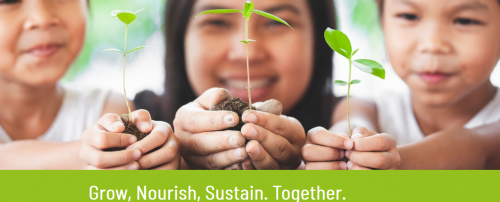
http://www.fao.org/world-food-day/themes/en/
http://www.fao.org/world-food-day/home/en/
Grow, Nourish, Sustain. Together.
Time to build back better!
In recent decades the world has made significant progress in improving agricultural productivity. Although we now produce more than enough food to feed everyone, our food systems are out of balance. Hunger, obesity, environmental degradation, loss of agro-biological diversity, food loss and waste and a lack of security for food chain workers are only some of the issues that underline this imbalance. As countries begin to develop and implement COVID-19 recovery plans, it is an opportunity to adopt innovative solutions based on scientific evidence so they can build back better and improve food systems, making them more resistant to shocks.
World Food Day is calling for global solidarity to help all populations, and especially the most vulnerable, to recover from the crisis, and to make food systems more resilient and robust so they can withstand increasing volatility and climate shocks, deliver affordable and sustainable healthy diets for all, and decent livelihoods for food system workers. This will require improved social protection schemes and new opportunities offered through digitalization and e-commerce, but also more sustainable agricultural practices that preserve the Earth’s natural resources, our health, and the climate.
Our actions are our future.
Countries, the private sector and civil society need to make sure that our food systems grow a variety of food to nourish a growing population and sustain the planet, together.
We all have a role to play, from increasing the overall demand for nutritious food by choosing healthy, to not letting sustainable habits fall by the wayside, despite these uncertain times.
Read more about how your everyday actions can make an impact!
Closing the digital gap
Digital technologies are key to transforming the way food is produced, processed, traded and consumed and building more resilient and robust food systems. They have the potential to close the great digital gap between developed and developing countries, cities and rural areas, men and women, young and old. But digitalization is a distant reality for over 3 billion people in the world who lack access to internet, most of whom live in rural and remote areas.
New technologies promise revolutionary changes for smallholder farmers. This includes satellite imaging, remote sensing and mobile and block chain Apps with the potential to optimize food chains, increase access to nutritious foods, reduce food loss and waste, improve water management, fight against pests and diseases, monitor forests or prepare farmers for disasters. Intensive training to enhance farmers’ digital skills, and giving voice to their needs and ideas, will be essential, as well as incentives to encourage the production of nutritious and diverse food.
Improved data analysis will also help governments in developing countries to make better decisions. FAO is ready to support countries as they identify partnerships to make this a reality, including investment opportunities from the private sector. This will be crucial to build the necessary infrastructure - broadband connections, data service providers – and to host data centres or cloud platforms that support big databases with vital information. FAO can offer sound technical advice on how better regulation and adequate training can pave the way to a digital future for food and agriculture.










Add new comment